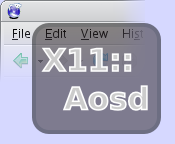NAME
X11::Aosd - libaosd binding for Cairo powered on screen display
SYNOPSIS
use X11::Aosd ':all'; my $aosd = X11::Aosd->new; $aosd->set_transparency(TRANSPARENCY_COMPOSITE); $aosd->set_position_with_offset( COORDINATE_CENTER, COORDINATE_CENTER, 200, 200, 0, 0 ); $aosd->set_renderer(sub { my ($cr) = @_; $cr->set_source_rgba (1, 0, 0, 0.5); $cr->rectangle (0, 0, 200, 200); $cr->fill; }); $aosd->show; $aosd->loop_for(2000);
DESCRIPTION
This Perl extension binds the aosd library. For now just the Cairo part is bound, Pango support may be added later.
REQUIREMENTS
This module needs libaosd version 0.2.4 or better installed on your system. Additionally the following Perl modules are required:
Glib Gtk2 Cairo
The development packages for the correspondent C libraries are required as well:
libglib2.0-dev libgtk2.0-dev libcairo2-dev
METHODS
Constructor
- $aosd = X11::Aosd->new()
-
The constructor takes no arguments. Everthing is controlled through the $aosd object.
Object configurators
- $aosd->set_name($name, $class)
-
Sets XClassHint name and class of the window.
- $aosd->set_transparency($mode)
-
Sets the transparency mode of the window. Valid modes are:
TRANSPARENCY_COMPOSITE TRANSPARENCY_FAKE TRANSPARENCY_NONE
- $aosd->set_geometry($x, $y, $width, $height)
-
Changes absolute position and dimensions of the window.
- $aosd->set_position_offset($x_offset, $y_offset)
-
Changes the current position by moving the window by the given offsets.
- $aosd->set_position_with_offset($abscissa, $ordinate, $width, $height, $x_offset, $y_offset)
-
Changes window position and dimension on the screen by positioning it horizontally ($abscissa) and vertically ($ordinate) adding the given offsets ($x_offset, $y_offset).
Use these constants to specify the window attachment parameters $abscissa and $ordinate.
COORDINATE_CENTER COORDINATE_MAXIMUM COORDINATE_MINIMUM
- $aosd->set_renderer($renderer, $user_data)
-
Apply your renderer to the OSD window. This is a subroutine resp. a closure with this signature:
sub renderer { my ($cr, $user_data) = @_; ... }$cr is the Cairo context managed by libaosd you can draw with. Anytime the surface needs to be (re)drawn the renderer is called. You can force calling it using the $aosd->render method (or even better $aosd->update - see below).
- $aosd->set_mouse_event_cb($callback, $user_data)
-
libaosd catches mouse clicks on the window. You can handle these events by attaching a callback, which has the following signature:
sub mouse_event { my ($event, $user_data) = @_; ... }$event is a hash reference with the following keys (all integers) corresponding to libaosd's AosdMouseEvent structure:
x y x_root y_root send_event button int
- $aosd->set_hide_upon_mouse_event($boolean)
-
Set this to a true value if the OSD window should automatically hide on mouse click.
Object inspectors
- ($name, $class) = $aosd->get_name
-
Returns XClassHint name and class of the window.
- ($trans) = $aosd->get_transparency;
-
Returns the current transparency mode of the window. Valid modes are:
TRANSPARENCY_COMPOSITE TRANSPARENCY_FAKE TRANSPARENCY_NONE
- ($x, $y, $width, $height) = $aosd->get_geometry;
-
Returns position and dimensions of the window.
- ($width, $height) = $aosd->get_screen_size;
-
Returns the dimensions of the X screen.
- ($shown) = $aosd->get_is_shown;
-
Returns a boolean whether the window is currently visible or not.
Object manipulators
- $aosd->render
-
This actually renders the window. Note that the X mainloop need to run at least one time ($aosd->loop_once) to take rendering effect. You can use the $aosd->update convenience method for render + loop_once.
- $aosd->show
-
Shows the OSD window (and renders it, if not rendered yet).
- $aosd->hide
-
Hides the OSD window.
Mainloop processing
libaosd can take control of the mainloop, but note that your program blocks when libaosd's mainloop is running. For simple programs libaosd's maninloop is Ok, but for more complex situations, e.g. drawing an animation, you should use Glib's mainloop instead (or any event loop you like, e.g. Event or EV).
Animations are always controlled through timeouts, so with Glib's mainloop this will look this way:
my $main_loop = Glib::MainLoop->new;
my $animation_step = 0;
$aosd->set_renderer(sub {
my ($cr) = @_;
#-- draw animation corresponding to $animation_step.
...
#-- quit mainloop when animation is finished
$main_loop->quit if $animation_step == $animation_last_step;
});
Glib::Timeout->add (20, sub {
++$animation_step;
$aosd->update;
1;
});
$main_loop->run;
Of course you don't need to quit the mainloop at the end of the animation. This is just for the simplicity of the example ;)
- $aosd->loop_once
-
Run the X mainloop one time. Needs to be called after rendering. You can use the $aosd->update convenience method for render + loop_once.
- $aosd->loop_for($loop_ms)
-
Runs the X mainloop for $loop_ms milliseconds, blocking your program for this amount of time.
Automatic object manipulator
- $aosd->flash($fade_in_ms, $full_ms, $fade_out_ms)
-
Fades in the OSD window in $fade_in_ms milliseconds, let it stay for $full_ms milliseconds and fades it out in $fade_out_ms milliseconds.
- $aosd->update
-
This is a convenience method for the combination:
$aosd->render; $aosd->loop_once;
CONSTANTS
EXPORT
None by default.
Exportable constants
Catch these with the ':all' import tag.
Required for set_position_with_offset():
COORDINATE_CENTER COORDINATE_MAXIMUM COORDINATE_MINIMUM
Required for set_transparency():
TRANSPARENCY_COMPOSITE TRANSPARENCY_FAKE TRANSPARENCY_NONE
KNOWN BUGS
Currently attached callbacks leak memory which won't be freed, even if the X11::Aosd instance is destroyed (note: attaching the callback leaks, not calling it, so it's not that evil ;).
SEE ALSO
Home of X11::Aosd:
http://www.exit1.org/X11-Aosd/
Home of libaosd:
http://www.atheme.org/projects/libaosd.shtml
AUTHOR
Joern Reder <joern AT zyn DOT de>
THANKS
Many thanks to Thorsten Schönfeld, who supported me with providing details of the Glib/Cairo/Perl binding stuff, which I didn't fully understand by myself ;)
COPYRIGHT AND LICENSE
Copyright (C) 2008 by Joern Reder
This library is free software; you can redistribute it and/or modify it under the same terms as Perl itself, either Perl version 5.8.8 or, at your option, any later version of Perl 5 you may have available.
